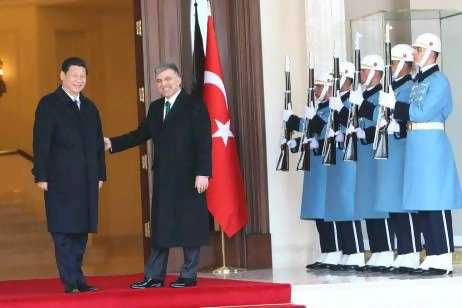ISTANBUL // Increased efforts by Turkey to attract Arab investors and improve relations with China are signs that Ankara is looking for new partners beyond Europe, analysts have said.

“Turkey cannot wait for Europe,” Idris Kardas, chief coordinator of the Platform for Global Challenges, a think tank at Istanbul’s Bilgi University, said this week.
Some countries in Europe, the traditional focus of Turkey’s foreign and economic policies, are battling a severe debt crisis. Therefore, Ankara is reaching out to other countries to develop its economy and regional clout, Mr Kardas said in an interview.
After hosting dozens of businessmen from the Gulf region representing sectors like energy, construction, agriculture and banking this month, Turkey this week rolled out the red carpet the red carpet for Xi Jingping, China’s vice-president, who is expected to move to the top post in about a year. Mr Xi chose Turkey as the last leg of a diplomatic tour seen as a dress rehearsal for Chinese leadership.
The visit came shortly after Ali Babacan, the Turkish deputy prime minister overseeing economic policy, confirmed that Turkey was looking for new partners outside Europe.
About 45 per cent of Turkish exports have been going to Europe, Mr Babacan told a CNN panel at the World Economic Forum in Davos in January. “But the good part of the picture is 55 per cent of our exports go elsewhere and those non-European markets are growing quite fast and that is playing a very good balancing role,” Mr Babacan said at the meeting.
Deniz Gokce, an economist who writes a column for the Turkish Aksam newspaper, said that trend was partly a result of Turkey’s experience of being rejected by the European Union, where major member states have reservations about Turkey’s membership bid.
“If Germany and France do not want us, then adios,” Mr Gokce told The National yesterday. Trying to find new economic partners elsewhere was an intelligent move by the Turkish government, he said: “Getting closer to places that have the capital.”
Mr Kardas said Turkey was not the only country looking for alternatives to Europe. “China has been severely affected by the crisis in Europe, so it also needs new partners.”
He said China also recognised Turkey’s growing regional role. “China regards Turkey as an important player in the Middle East,” he said.
Mr Xi told a Turkish-China business forum in Istanbul on Wednesday that Turkish and Chinese companies signed agreements worth nearly US$4.3 billion (Dh15.79bn) during his visit, according to Turkish and Chinese media reports. On Tuesday, the Chinese vice-president met with Abdullah Gul, the president, and Recep Tayyip Erdogan, the prime minister.
Mr Erdogan accepted an invitation to visit China in April, according to Zafer Caglayan, the Turkish trade minister.
“Turkey has become one of the world’s most interesting countries,” Mr Xi told the business forum. China and Turkey have agreed to increase their trade volume from about $20bn now to $100bn by 2020.
Both sides played down political differences during Mr Xi’s visit. Members of China’s Uighur community in exile protested against Mr Xi’s visit in Ankara, but the Turkish government did not address the issue in public.
Mr Erdogan, who accused China of “genocide” against the Uighurs three years ago, was quoted by the state-run Chinese newspaper China Daily as telling Mr Xi that Turkey “never allowed any activity on its territory that aims to undermine China’s independence, sovereignty and territorial integrity”.
Differences over Syria were also put aside. While Turkey is calling for the Syrian leader Bashar Al Assad to hand over power, China vetoed a resolution in the United Nations Security Council calling on Mr Assad to quit. But both sides refrained from commenting publicly on the issue during Mr Xi’s visit.
Turkey has been enjoying an impressive economic boom that has more than tripled the country’s gross domestic product between 2002 and 2010, when it reached about $736bn. In an effort to keep that momentum going, Turkey has started to advertise itself as an alternative to Europe to attract foreign investors.
Speaking at the first business forum of Turkey and the six countries of the Gulf Cooperation Council (GCC) in Istanbul this month, Mehmet Simsek, Turkey’s minister of finance, said his country was offering attractive investment conditions.
Turkey “has very good opportunities in many sectors – agriculture, tourism, energy, health,” Mr Simsek said. “At the Gulf, there are capabilities, funds, resources. It is a wonderful combination.”
During a visit to Dubai in January, Mr Gul invited Arab businessmen to his country and said Europe no longer had large potential. “Europe has grown as much as it can grow,” Mr Gul said, according to Turkish media. “There are no new buildings, roads, subways and airports left to be built. And Europe’s population is ageing.”
via Turkey’s rolling out the red carpet for trade partners beyond Europe – The National.

Leave a Reply